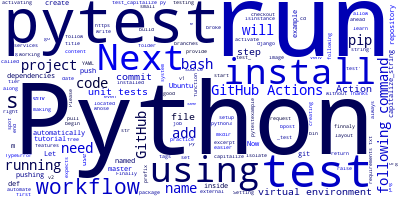Run your Python Unit Tests with GitHub Actions

In this tutorial, we'll learn how to automatically run your Python unit tests using GitHub Actions.
We'll see how to set up a GitHub Actions workflow that install Python 3.6 inside a Ubuntu system along with our project's dependencies e.g. pytest and finnaly run the unit tests after pushing our code to a GitHub repository.
Let's see how to automate running unit tests when making a commit and pushing your code to GitHub or when making a pull request.
Thanks to GitHub Actions it's now easier than before without using any external services and they even provide a good free tier.
This will allow you to spot the right commit(s) that broke your code.
We'll be using Python 3, and we will be working in a virtual environment. This is a good practice for Python to isolate system packages from our project's package. Even if this is a small example but should be a practice that you need to always follow.
Let's start by creating and activating a virtual environment for our project, by running the following commands:
$ mkdir pytestexample
$ cd pytestexample
$ python3 -m venv .env
This will create a virtual environment called .env in our project's folder.
Next, we need to activate this virtual environment using the following command:
$ source .env/bin/activate
Next, let’s install pytest in our project's virtual environment using the following command:
$ pip install pytest
Setting up A Python Project with PyTest
We'll be using pytest for testing.
It can be installed using the following command inside your virtual environment:
$ pip install pytest
Pytest expects our tests to be located in files whose names begin with
test_or end with_test.py.
Next, go ahead and add some tests:
Next, we'll create a file named test_capitalize.py, next add the following Python code:
# test_capitalize.py
def capitalize_string(s):
return s.capitalize()
Next, we'll need to write a test. We need prefix the test function name with test_, since this is what pytest expects:
# test_capitalize.py
def capitalize_string(s):
if not isinstance(s, str):
raise TypeError('Please provide a string')
return s.capitalize()
def test_capitalize_string():
assert capitalize_string('test') == 'Test'
You can run the test, by running the following command:
$ pytest
Finally, we need to create a requirements.txt file using the following command:
$ pip freeze > requirements.txt
Now that we made sure that our example is running locally with this simple example, let's set up a GitHub Actions workflow for automatically running the test(s) when our code is pushed to GitHub.
Setting up a GitHub Actions Workflow
You can create a workflow by creating a YAML file inside the .github/workflows/ci.yml folder.
Next, open the file and add the following content:
name: Run Python Tests
on:
push:
branches:
- master
pull_request:
branches:
- master
jobs:
build:
runs-on: ubuntu-latest
steps:
- uses: actions/checkout@v2
- name: Install Python 3
uses: actions/setup-python@v1
with:
python-version: 3.6
- name: Install dependencies
run: |
python -m pip install --upgrade pip
pip install -r requirements.txt
- name: Run tests with pytest
run: pytest
This workflow is named Run Python Tests. it will be started when pushing or pulling code from the master branch of our repository. It contains one job named build with four steps which will run inside a Ubuntu runner.
We first give the workflow access to the code of the repository using the checkout@v2 action. Next, we add a step named Install Python 3 which makes use of the setup-python@v1 action to install Python 3.6. Next, we add a step that will install the dependencies of our project in Ubuntu. Finally we add a step for running our tests using pytest.
Now you simply need to run the following commands to commit and push to GitHub repository and wait for your tests to automatically run:
$ git add -A
$ git commit -m "First commit"
$ git push origin master
Conclusion
In this tutorial, we've seen how to use a GitHub Actions workflow to automate running your Python tests with Pytest.
-
Date:








